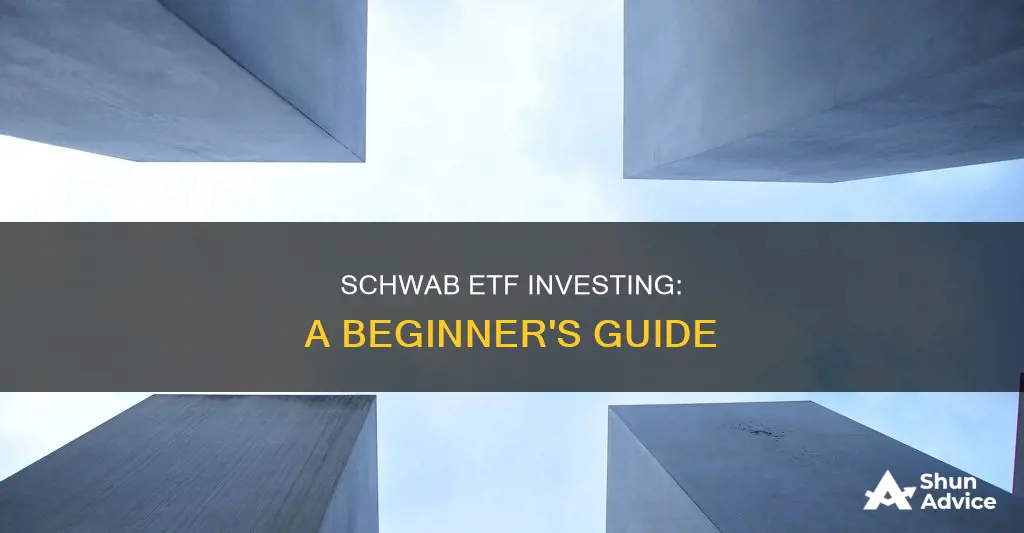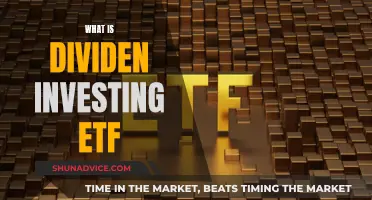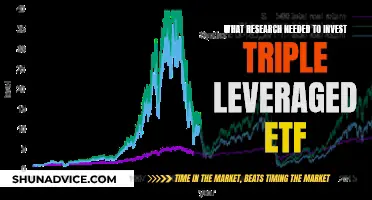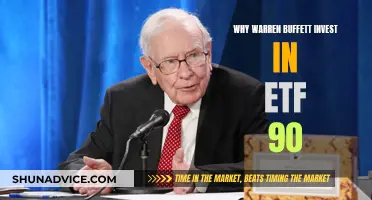
Investing in ETFs (exchange-traded funds) on Schwab can be a great way to strengthen the foundation of your portfolio. With over 2000 ETFs across a range of asset classes and fund companies, Schwab offers a wide selection of low-cost investment options. ETFs on Schwab are traded on U.S. exchanges with $0 per trade online, making them an affordable choice for investors. In addition, ETFs provide the benefit of diversification, allowing you to invest in a variety of stocks, bonds, or other securities in one fund. With Schwab, you can access a range of ETF options, from low-cost Schwab ETFs to a broad selection of third-party ETFs, providing you with exceptional choice and flexibility in building your investment portfolio.
| Characteristics | Values |
|---|---|
| Number of low-cost Schwab ETFs | 22-25+ |
| Number of ETFs across a range of asset classes and fund companies | 2,000+ |
| Cost of all listed ETFs traded on U.S. exchanges | $0 per trade online |
| Number of third-party ETFs on U.S. exchanges | 3,000+ |
| Number of ETF categories on Schwab | 74+ |
| Number of commission-free listed ETFs | 3,000+ |
What You'll Learn

Schwab ETF costs and fees
Charles Schwab offers a wide range of Exchange-Traded Funds (ETFs) with some of the lowest costs in the industry. Here is a breakdown of the costs and fees associated with ETFs on Schwab:
- Operating Expense Ratio (OER): The OER is an annual fee charged by the fund company, expressed as a percentage of a fund's average net assets. Passively managed funds, which track a specific market index, typically have lower OERs than actively managed funds. At Schwab, the OER for passively managed ETFs can range from 0.03% to 0.39%, while the OER for actively managed ETFs varies from fund to fund but tends to be higher.
- Trade Commission: Schwab offers $0 online commission per trade on over 3,000 U.S. exchange-listed ETFs. However, unlisted ETFs are subject to a commission.
- Bid/Ask Spreads: The difference between the bid price (highest price a buyer is willing to pay) and the ask price (lowest price a seller will accept) can impact your trade costs. This cost is particularly important if you plan to hold an ETF for less than a year.
- Management Fees: ETFs are subject to management fees, which vary depending on the fund. These fees are disclosed in the prospectus of each ETF.
- Other Fees: Additional regulatory and exchange fees may apply when investing in ETFs, similar to other types of investments.
Schwab is known for its low-cost ETF investing, and its ETFs have among the lowest operating expenses in the industry. With Schwab, you can access a broad selection of ETFs from Schwab and third-party providers, providing you with a diverse range of investment options.
Crude Oil ETFs: How to Invest Wisely
You may want to see also

The benefits of Schwab ETFs
Schwab offers a wide range of exchange-traded funds (ETFs) that provide investors with a variety of benefits. Here are some of the key advantages of investing in Schwab ETFs:
Low Costs and $0 Commissions
Schwab ETFs are known for their low costs, with over 25 ETFs available at low prices. Additionally, Schwab offers $0 online commission per trade on over 3,000 U.S. exchange-listed ETFs, allowing investors to save money on each transaction. This makes it an affordable option for those looking to invest in ETFs.
Diversification
ETFs are an excellent way to diversify your portfolio. A single ETF can include a diverse mix of domestic and international stocks, bonds, and other securities, providing exposure to a wide range of asset classes. This diversification helps to lower your risk and exposure, as your investments are spread across various industries and markets.
Tax Efficiency
Schwab ETFs are known for their tax efficiency. They tend to have lower operating expenses than mutual funds, and these savings are passed on to investors in the form of lower fees. Additionally, ETFs are typically more tax-efficient than actively managed mutual funds, which can further enhance your investment returns.
Trading Flexibility
Similar to stocks, ETFs offer trading flexibility as they can be traded anytime during market hours. This gives investors the ability to buy and sell throughout the day, allowing for more dynamic investment strategies.
Broad Selection
Schwab provides access to a broad selection of ETFs, including their own low-cost ETFs as well as over 2,000 third-party ETFs across various asset classes and fund companies. This extensive selection allows investors to find ETFs that align with their specific investment goals and strategies.
Powerful Tools and Research
Schwab offers a range of powerful tools and research resources to help investors make informed decisions about their ETF investments. This includes the Personalized Portfolio Builder tool, which simplifies the process of creating a diversified ETF portfolio.
In summary, Schwab ETFs offer a range of benefits, including low costs, diversification, tax efficiency, trading flexibility, a broad selection of investment options, and access to powerful tools and research. These advantages make Schwab ETFs a compelling choice for investors looking to add ETFs to their investment portfolios.
A Beginner's Guide to US ETF Investing
You may want to see also

How to start investing in Schwab ETFs
Investing in ETFs (exchange-traded funds) can be a great way to strengthen the foundation of your portfolio. Here is a step-by-step guide on how to start investing in Schwab ETFs:
- Open an Account with Schwab: To get started with Schwab ETFs, you will need to open an account on their platform. You can do this by visiting the Schwab website and providing the necessary personal and financial information.
- Understand ETFs: Before investing, it is essential to understand what ETFs are and how they work. ETFs are funds that trade on exchanges, typically tracking a specific index. They provide an affordable and diverse investment option, allowing you to buy and sell a bundle of assets during market hours. ETFs are known for their flexibility, low operating expenses, and potential tax efficiency.
- Explore Schwab's ETF Offerings: Schwab offers a wide range of ETFs to choose from. They provide over 25 low-cost Schwab ETFs, including the Schwab Mortgage-Backed Securities ETF, Schwab Ultra-Short Income ETF, and Schwab Fundamental U.S. Large Company ETF. These ETFs cover various asset classes, such as domestic and international stocks, bonds, and commodities.
- Research and Compare ETFs: Schwab offers comprehensive research tools and resources to help you make informed investment decisions. Utilize their ETF screener, expert insights, and side-by-side comparisons to evaluate different ETFs and identify those that align with your investment goals and risk profile.
- Build Your ETF Portfolio: Once you have a good understanding of the available ETFs, you can start building your portfolio. Consider using Schwab's Personalized Portfolio Builder tool, which can help you create a diversified portfolio of ETFs that meets your specific needs and investment strategy.
- Start Investing: When you're ready, you can begin investing in the selected ETFs through your Schwab account. Remember that ETFs are bought and sold like common stock on a stock exchange, and you can trade them during market hours.
By following these steps, you can start investing in Schwab ETFs and take advantage of their low costs, diversification benefits, and potential tax efficiency to strengthen your investment portfolio.
A Beginner's Guide to Investing in BTC ETFs
You may want to see also

Schwab ETF options
Schwab offers a wide variety of ETFs (exchange-traded funds) at some of the lowest costs. ETFs can be a valuable addition to your portfolio, providing advantages such as broad diversification, lower operating expenses than mutual funds, and the potential for tax benefits.
Schwab ETFs can be used as the foundation of your portfolio, with some of the lowest operating expenses in the industry. They offer $0 online commission per trade on over 3,000 U.S. exchange-listed ETFs, including their own low-cost ETFs.
- Schwab Mortgage-Backed Securities ETF (SMBS): This ETF aims to track the total return of an index composed of investment-grade mortgage-backed securities issued and/or guaranteed by U.S. government agencies.
- Schwab Ultra-Short Income ETF (SCUS): The goal of this ETF is to seek income consistent with capital preservation and daily liquidity. It invests in short-term, investment-grade debt securities issued by U.S. and foreign companies.
- Schwab Fundamental U.S. Large Company ETF (FNDX): This ETF tracks the total return of an index that measures the performance of large U.S. companies based on their fundamental size and weight.
In addition to these, Schwab offers a range of market cap domestic equity and international equity ETFs, as well as Fixed Income ETFs, to help diversify your portfolio.
Schwab also provides tools and resources to help you build a diversified ETF portfolio, such as the Personalized Portfolio Builder tool, which simplifies the process of creating a diversified portfolio.
ETFs: Understanding Their Status Under the 1940 Act
You may want to see also

Schwab ETF vs mutual funds
Exchange-traded funds (ETFs) and mutual funds are both managed "baskets" or "pools" of individual securities, like stocks or bonds. They can be designed to track an index or actively managed to outperform an index. They generally provide more diversification than a single stock or bond and can be used to create a diversified portfolio when funds from multiple asset classes are combined.
ETFs trade like stocks and are bought and sold on a stock exchange, with price changes throughout the day. The price at which you buy an ETF will likely differ from the prices paid by other investors. Mutual funds are generally bought directly from investment companies instead of from other investors on an exchange. Orders are executed once per day, with anyone who invests on the same day receiving the same price.
Most ETFs are considered "passive" investments because they are designed to track the performance of a particular index. They might do this by owning many of the same securities held in equal portions to their representation on that index. Fund managers do have the discretion to substitute and leave off some securities, so long as their fund's performance doesn't stray too far from that of the index it's supposed to track.
Mutual funds come in both active and indexed varieties, but most are actively managed. Active mutual funds are managed by fund managers with an eye toward beating whatever benchmark they're using to measure their performance.
ETFs do not require a minimum initial investment and are purchased as whole shares. You can buy an ETF for the price of just one share, usually referred to as the ETF's "market price." Mutual funds, on the other hand, have minimum initial investments that are normally a flat dollar amount and aren’t based on the fund's share price. Mutual funds can be purchased in fractional shares or fixed dollar amounts.
ETFs can potentially generate fewer capital gains for investors since they may have lower turnover and can use the in-kind creation/redemption process to manage the cost basis of their holdings. A sale of securities within a mutual fund may trigger capital gains for shareholders—even for those who may have an unrealized loss on the overall mutual fund investment.
Consider an ETF if you trade actively, are tax-sensitive, or want niche exposure. Consider a mutual fund if you invest frequently, want a fund that could potentially outperform the benchmark index, or are investing in a less efficient market.
Ally Invest's SPDR ETF Offerings: What You Need to Know
You may want to see also
Frequently asked questions
To get started with investing in ETFs on Schwab, you need to open an account. You can then use the tools provided by Schwab to build your portfolio.
ETFs (exchange-traded funds) are an affordable way to access a wide variety of asset classes. They combine the flexibility of stocks and the portfolio-diversifying strengths of mutual funds. ETFs also tend to have lower operating expenses than mutual funds, which can result in lower fees and potential tax benefits.
Schwab offers multiple ways to put together an ETF portfolio, including research and powerful tools to do it yourself, as well as the free Personalized Portfolio Builder tool. You can research and compare ETFs, evaluating them side-by-side with mutual funds to make better-informed investment decisions.
Schwab offers \$0 online commission per trade on over 3,000 U.S. exchange-listed ETFs. However, there may be other costs associated with investing in ETFs, such as operating expense ratios (OER) and bid/ask spreads.







